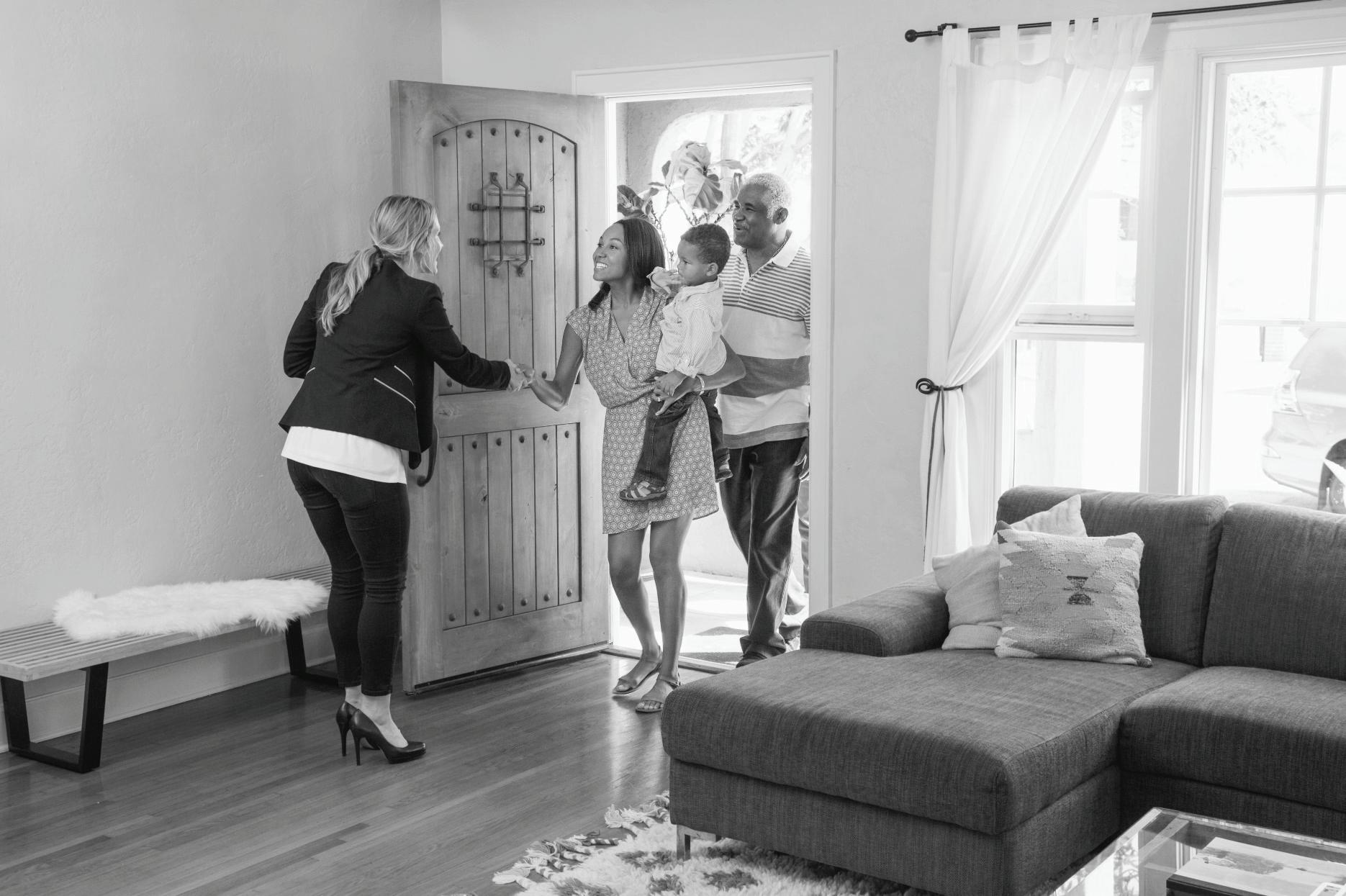
8 minute read
How to Make Your Dream of Homeownership a Reality
Once you have a real estate professional securely in your corner, you’ll want to understand a little bit more about the homebuying process. Here’s a look at three important questions to think through.
1. How Can I Better Understand the Process, and How Much Can I Afford?
Advertisement
The process of buying a home is not one to enter lightly. You need to decide on key things like how long you plan on living in an area, school districts you prefer, what kind of commute works for you, and how much you can afford to spend. According to ConsumerReports.org:
“Financial planners recommend limiting the amount you spend on housing to 25 percent of your monthly budget.” Keep in mind, before you start the process of purchasing a home, you’ll also need to apply for a mortgage. Lenders will evaluate several factors connected to your financial track record, one of which is your credit history. They’ll want to see how well you’ve been able to minimize past debts, so make sure you’ve been paying your student loans, credit cards, and car loans on time.
2. How Much Do I Need for a Down Payment?
In addition to knowing how much you can afford on a monthly mortgage payment, understanding what you’ll need for a down payment is another critical step. Thankfully, there are many different options and resources available to potentially reduce the amount you may think you need to put down on a home. If you’re concerned about saving for a down payment, start small and be consistent. A little bit each month goes a long way. Jumpstart your savings by automatically adding a portion of your monthly paycheck into a separate savings account or house fund.
AmericaSaves.org says:
“Over time, these automatic deposits add up. For example, $50 a month accumulates to $600 a year and $3,000 after five years, plus interest that has compounded.” Before you know it, you’ll have enough for a down payment if you’re disciplined and thoughtful about your process. The 2019 Home Buyer Report conducted by NerdWallet says:
“The truth: 32% of current U.S. homeowners put 5% or less down on their home, according to census data.”
3. Am I Practicing Living on a Reasonable Budget?
As tempting as it is to settle in each morning with a fancy cup of coffee from your favorite local café, putting that daily spend toward your down payment will help accelerate your path to homeownership. It’s the little things that count, so start trying to live on a slightly tighter budget if you aren’t doing so already. A budget will allow you to save more for your down payment and help you pay down other debts to improve your credit score. A recent survey shared on Bankrate.com says:
“70 percent of would-be first-time homebuyers will cut spending on spa days, shopping and going to the movies in exchange for purchasing a home within the next year.” While you don’t need to cut all the fun out of your current lifestyle, making smarter choices and limiting your spending in areas where you can slim down will make a big difference.
Bottom Line
If homeownership is on your wish list this year, take a good look at what you can prioritize to help you get there, and you’ll be one step closer to making your dream a reality.

why pre-approval should be your first step

In many markets across the country, the number of buyers searching for their dream home greatly exceeds the number of homes for sale, driving a competitive marketplace where it can be tough to stand out. Since you know you’ll need to apply for a mortgage before you purchase a home, one way to show you’re serious about buying is to get pre-qualified or pre-approved before you start your search. Even if you're in a market that's not as strapped for inventory, understanding your budget will help you know if your dream home is within your reach. Freddie Mac lays out the advantages of pre-approval in the My Home section of their website:
“It’s highly recommended that you work with your lender to get pre-approved before you begin house hunting. Pre-approval will tell you how much home you can afford and can help you move faster, and with greater confidence, in competitive markets.” One of the advantages of working with a local real estate professional is that many have relationships with lenders who will be able to help you through this process. Once you’ve selected a lender, you'll need to fill out their loan application and provide them with important information regarding “your credit, debt, work history, down payment and residential history.” Freddie Mac describes the "4 Cs" that help determine the amount you’ll be qualified to borrow: 1. Capacity: Your current and future ability to make your payments 2. Capital or Cash Reserves: The money, savings, and investments you have that can be sold quickly for cash 3. Collateral: The value of the assets you’re pledging as security against the loan 4. Credit: Your history of paying bills and other debts on time Getting pre-approved is one of the many steps that will show home sellers you’re serious about buying. Completing this in advance often accelerates the process once your offer has been accepted.
Bottom Line
If you're ready and willing to buy, getting pre-approved will help you feel more informed and may even give you the edge you need in today’s competitive homebuying process.
For more information about the Prosperity Buyer Advantage, contact me today! Prosperity
Buyer Advantage™



Buying a home? Get a step ahead.
Obtaining a mortgage preliminary approval is a great place to begin when buying a home. But if you want a home purchase o er to stand out to sellers, ask about the Prosperity Buyer Advantage. 1
By electing to participate, clients can get much of the home nancing process out of the way and obtain a Commitment Letter before beginning to search for a home. What are the bene ts?
• Complimentary – Choosing to participate costs nothing additional. • Distinguished – A Commitment Letter can set a client’s home purchase o er apart from other o ers a seller may be considering. • Smooth – With much of the home nancing process completed up-front, additional requirements or conditions can be identi ed to help prevent last-minute issues. • Flexible – Clients may have the option of being more exible with their closing date and also help ensure an on-time closing. Stand out in today’s market. Ask for the Prosperity Buyer Advantage!
1. Prosperity Buyer Advantage is not a loan approval. A Commitment Letter is based on information and documentation provided by you and a review of your credit report. The interest rate and type of mortgage used to approve you for a speci ed loan amount is subject to change, which may also change the terms of approval. The interest rate cannot be locked until your o er to purchase a property has been accepted. If the interest rate used for credit approval has changed, you may need to re-qualify. Information provided by you is subject to review and all other loan conditions must be met. After you have chosen a home and your o er has been accepted, nal loan approval will be contingent upon obtaining an acceptable appraisal and title commitment. Additional documentation may be required. All rst mortgage products are provided by Prosperity Home Mortgage, LLC. (877) 275-1762. Prosperity Home Mortgage, LLC products may not be available in all areas. Not all borrowers will qualify. Licensed by the NJ Department of Banking and Insurance. Licensed by the Delaware State Bank Commissioner. Also licensed in District of Columbia, Florida, Georgia, Indiana, Maryland, Michigan, North Carolina, Pennsylvania, South Carolina, Tennessee, Virginia, and West Virginia. NMLS ID #75164 (NMLS Consumer Access at http://www.nmlsconsumeraccess.org/) ©2018 Prosperity Home Mortgage, LLC. All Rights Reserved. (03/18)
two myths that may be holding you back from buying

The 2020 Millennial Home Buyer Report shows how this generation is not really any different from previous ones when it comes to homeownership goals:
“The majority of millennials not only want to own a home, but 84% of millennials in 2019 considered it a major part of the American Dream.” Unfortunately, the myths surrounding the barriers to homeownership – especially those related to down payments and FICO® scores – might be keeping many buyers out of the arena. The piece also reveals:
“Millennials have to navigate a lot of obstacles to be able to own a home. According to our 2020 survey, saving for a down payment is the biggest barrier for 50% of millennials.” Millennial or not, unpacking two of the biggest myths that may be standing in the way of homeownership among all generations is a great place to start the debunking process.
Myth #1: “I Need a 20% Down Payment”
Many buyers often overestimate what they need to qualify for a home loan. According to the same article:
“A down payment of 20% for a home of that price [$210,000] would be about $42,000; only about 30% of the millennials in our survey have enough in savings to cover that, not to mention the additional closing costs.”








